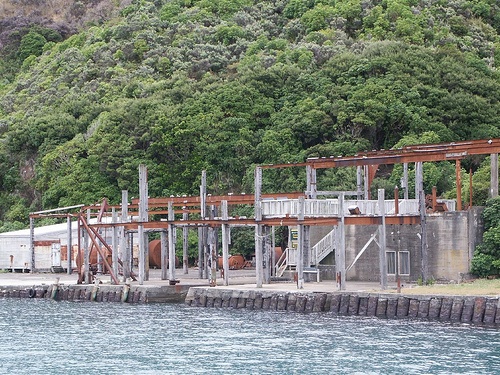
Perano Whaling Station (1911)
Last gasp of the ‘robber economy’?
Whaling off the New Zealand coast did not die with the sacking of Kororāreka or the departure of the last Nantucket ship. In Cook Strait and around the East Coast the ‘robber economy’ lingered on well into the 20th century. Tory Channel in the Marlborough Sounds book-ended the era of New Zealand shore whaling.
At Te Awaiti, established by the legendary John Guard fleetingly in 1827 and permanently from 1830-31, you can still see trypots, the terraces of European huts and historic graves. But we are more interested here in an operation of a different sort. In 1911 at nearby Fisherman’s Bay the Perano family, Genoese-New Zealand fishermen who drifted into whaling just after the turn of the century, started killing humpbacks. In their peak years they built high-speed whale chasers and hunted with bomb lances, and they finished up with the big steam chaser Orca and a spotter aircraft. By the early 1960s, however, both economics and public sentiment were running against whaling. Four days before Christmas 1964, gunner Trevor Norton caught the last whale in New Zealand waters and brought to an end the working life of the country’s last big shore-whaling station.
You can still see an impressive wharf and the skeletal remains of the processing complex, complete with the slipway once used to haul up the whales for processing. The Department of Conservation completed restoration work in 2010. And as for the whalers? When the season is right a few of these ageing hunters still climb to the top of Arapawa Island to scan the sea for migrating humpbacks, but strictly to monitor and count them for conservation reasons.
Further information
This site is item number 79 on the History of New Zealand in 100 Places list.
Websites
- Whaling – Te Ara
- Joseph Perano biography – Te Ara
- Perano Whaling Station (video)
- Killers to conservationalists (article)
- DOC’s Archaeology of NZ Shore Whaling (PDF)
Book
- Don Grady, The Perano whalers of Cook Strait 1911-1964, A.H. & A.W. Reed, Wellington, 1984





Community contributions